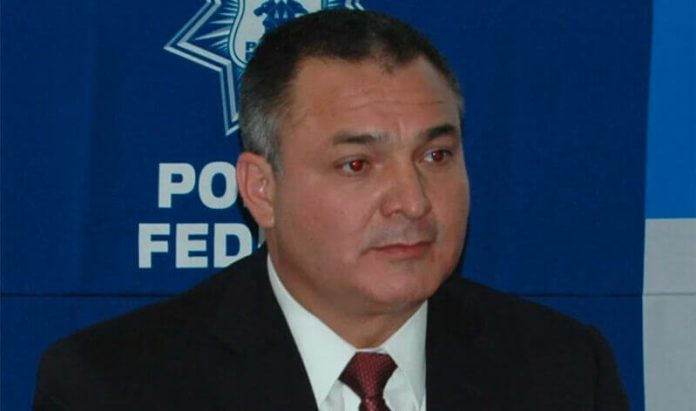Evidence and accusations are piling up against Mexico’s former top security official, Genaro García Luna, as U.S. prosecutors proffer new records in their case alleging he pocketed bribes from drug traffickers and Mexico demands the return of millions of alleged illegal assets.
In a September 29 filing in a New York federal court, prosecutors said they would provide García’s defense lawyers with new evidence to be used in the trial against him, including Mexican government documents, U.S. State Department records, photos and bank records. García, who served as Mexico’s minister of public security from 2006 to 2012 under then-president Felipe Calderón, is accused of accepting multimillion-dollar bribes from the Sinaloa Cartel in exchange for letting the group traffic multi-ton loads of cocaine into the United States.
The filing comes a little more than a week after Mexico’s Financial Intelligence Unit (UIF) announced its “first civil lawsuit abroad to recover assets related to illegal financial operations carried out by Genaro García Luna.”
After leaving office, García — along with a former high-ranking Mexican government official, several business associates, a network of companies and his wife — illegally obtained at least $250 million from the Mexican government between 2012 and 2018 through a “complicated unlawful government-contracting scheme,” officials alleged in the lawsuit filed in a Florida court on September 21. Those funds were then allegedly transferred out of Mexico using an “extensive” network in order to “hide the stolen funds in numerous assets” located in the United States.
US authorities arrested García in the state of Texas in December 2019 on cocaine trafficking conspiracy charges and making false statements. He pleaded not guilty to the charges last year.
Shortly after his arrest, UIF head Santiago Nieto filed two complaints against García with anti-corruption prosecutors in Mexico. The agency alleged he used tax havens around the world – including the United States, Barbados and Hong Kong – to conceal more than $50 million in bribes he is suspected of accepting from drug traffickers.
InSight Crime analysis
As the evidence in García’s drug case mounts, the latest allegations levied by the Mexican government point at suspected criminal activity exceeding what occurred during his time as a security official.
While U.S. prosecutors allege García used his role atop Mexico’s security forces to act as a key conduit for one of Latin America’s most powerful organized crime groups, Mexican officials said his misconduct extended to being the “principal architect” and one of the “ultimate beneficiaries” of a vast “money laundering empire” they dubbed “the Enterprise.”
Through suspected bribery, bid tampering and corruption in Mexico, officials allege he “used his influence with the Mexican government to override Mexican government contract and bidding procedures, and to ensure selection of his co-conspirators for multiple government contracts,” according to the lawsuit.
Between 2015 and 2019, Mexican authorities identified at least 30 transfers totaling hundreds of thousands of dollars of allegedly stolen government funds deposited by the network into accounts in the United States that were then routed to accounts in Barbados. All of those accounts, according to the complaint, were supposedly controlled by García and his associates.
What’s more, the group engaged in additional racketeering activity by using the stolen funds to manage and maintain the money laundering network through “international wire transfers, property tax payments, fee payments, and other payments to maintain, upkeep, and manage the Enterprise,” officials said.
García was never charged with any wrongdoing in Mexico during or immediately after his time as a top security official. Only after almost a year of being detained in the United States did Mexican authorities even issue an arrest warrant for him on illicit enrichment charges.
The scale of alleged corruption, if proven, is not only egregious – it is shocking for a man once entrusted with designing and executing Mexico’s assault on organized crime and drug trafficking.
Reprinted from InSight Crime. Parker Asmann is a writer with InSight Crime, a foundation dedicated to the study of organized crime.
